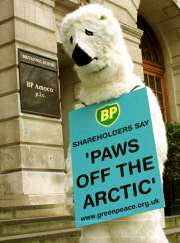WWF and ethical investment

|

|

|
Greenpeace campaigners joined forces with WWF for
the 2000 BP-Amoco annual general meeting
|
The question of whether a charity’s investments could
undermine its objectives and mission is one that has
concerned many charities for years - and
WWF-UK, with an ethical investment policy in place since
1991, is no exception.
WWF carefully screens
its portfolio to assess the long-term impacts of
companies’ activities on the environment. This has led
to an ‘exclusion list’ of companies that WWF will not
invest in. Additionally, over 10 per cent of reserves
are invested directly into ‘ethical’ funds. To enhance
this policy further, WWF sends an environmental
questionnaire to a number of companies in which it
invests. It then discusses their environmental impacts
and, where appropriate, engages on issues where it
thinks they could improve. Finally, all WWF staff are
given the option to invest their own pension in an
ethical fund.
We has also explored the use of
voting rights. In 2000 it joined forces with other NGOs
to support a shareholder resolution at BP Amoco’s Annual
General Meeting. This called on the company to halt
plans to drill for oil in the coastal plain of Alaska’s
Arctic National Wildlife Refuge and to switch resources
to renewable energy sources. WWF is encouraging all
investors to engage with BP’s management on this issue,
particularly those ethical investment or occupational
pension funds which claim to have a socially responsible
engagement policy.
|

